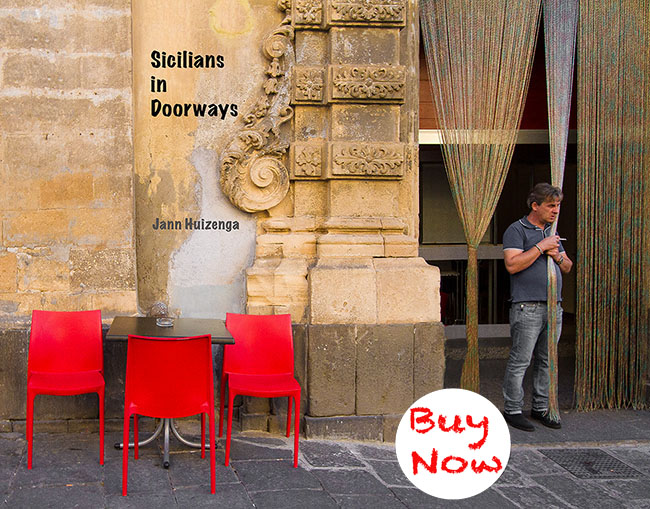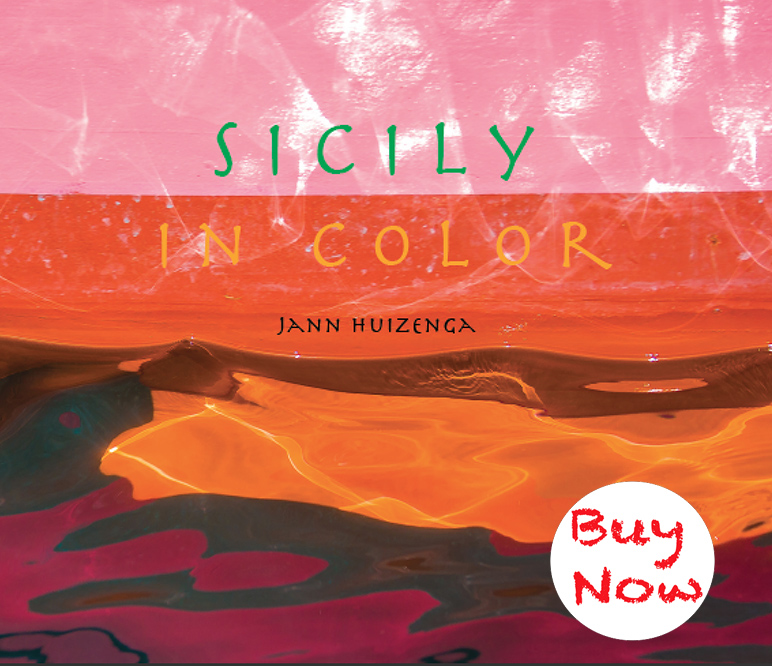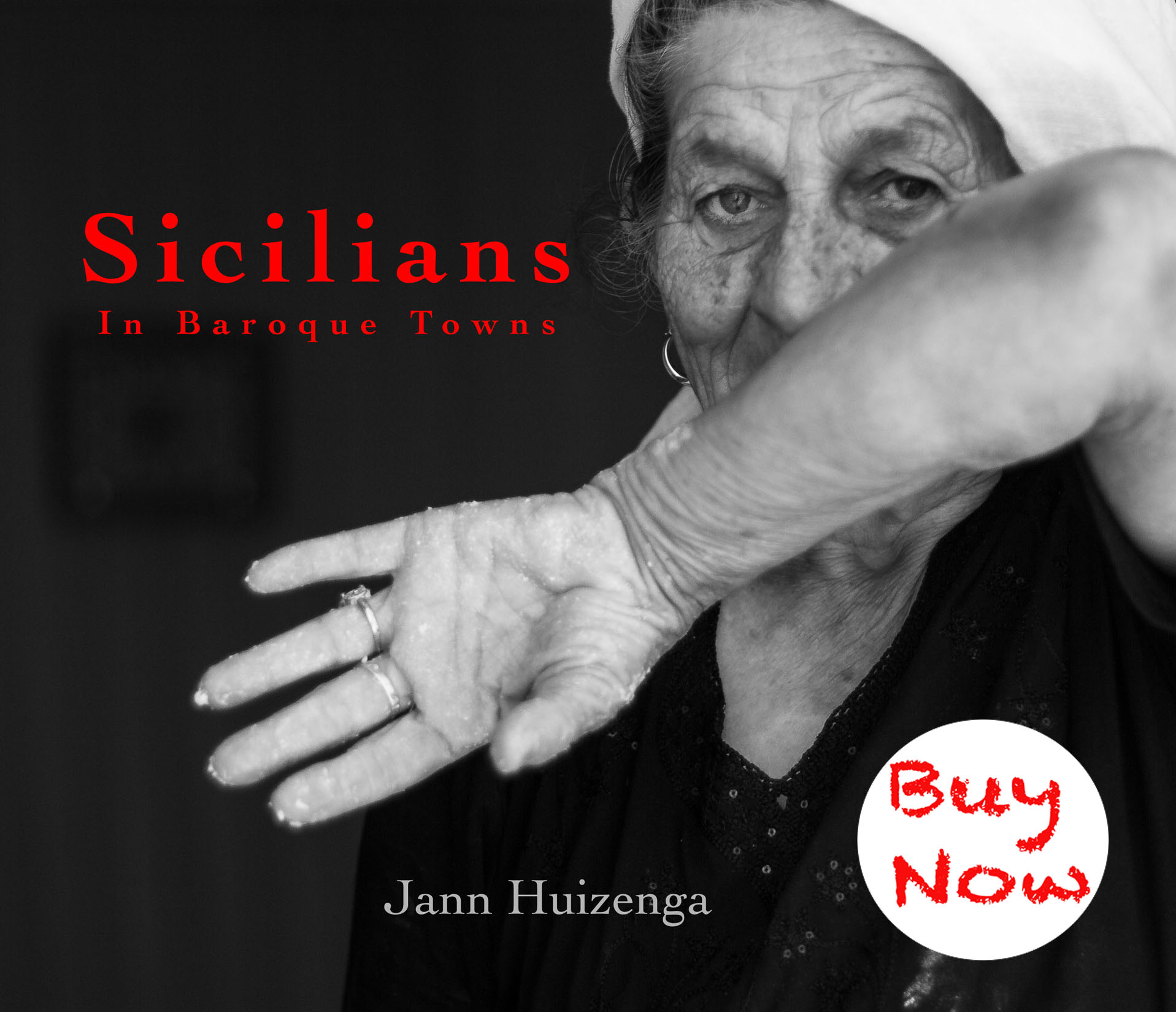December 11, 2010
Fifty cents. What does it get you? Not much of anything in the US these days, and certainly nothing beautiful.
But here, in Sicily, look what 50 cents will buy:
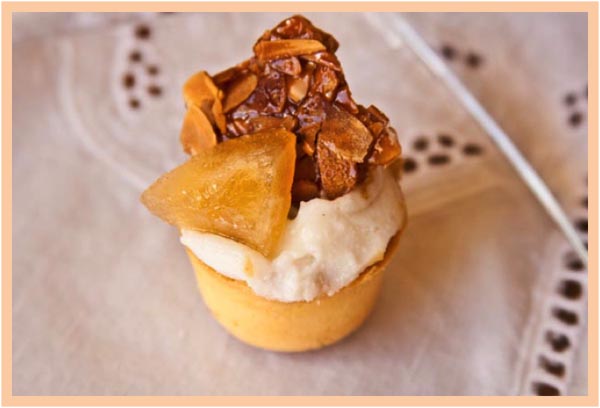 Canestrino (basket) with sweet ricotta, garnished with almond brittle and candied lemon peel
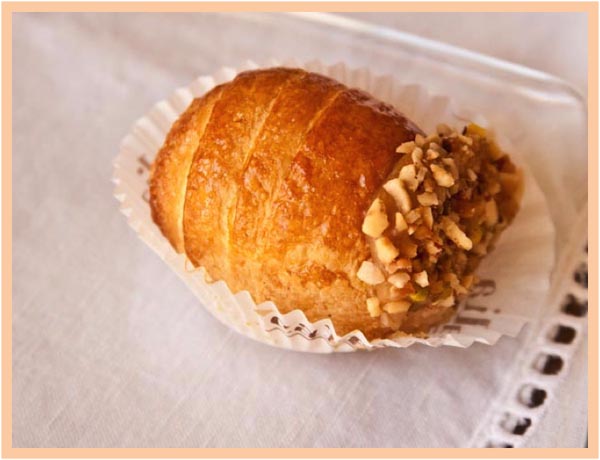 Sfogliatina (puff pastry) with hazelnut cream and pistachio nuts 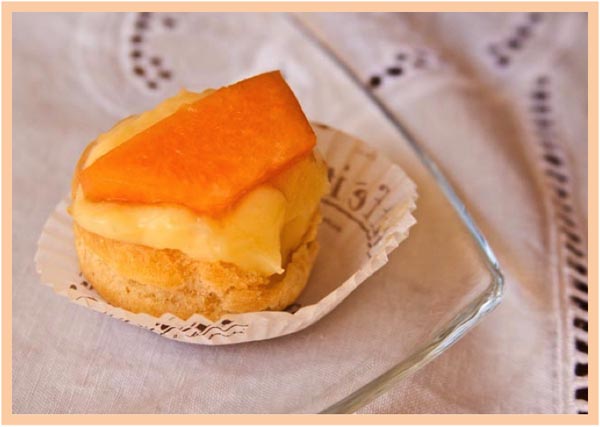 Bigne (cream puff) with sweet cream and cantalope slice With their opulent use of ornamentation and chiaroscuro, Sicilian pastry chefs are small-scale baroque architects.
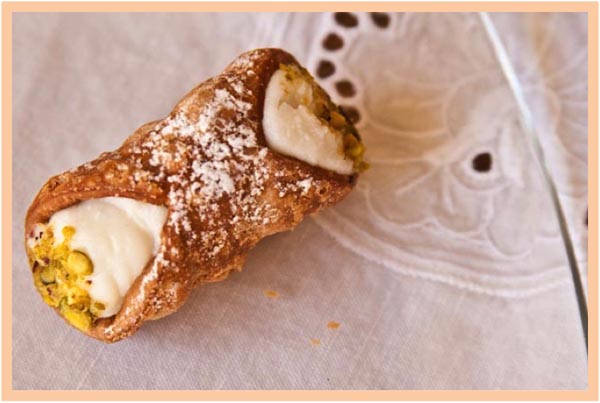 Cannolo with sweet ricotta cream and pistachio nuts 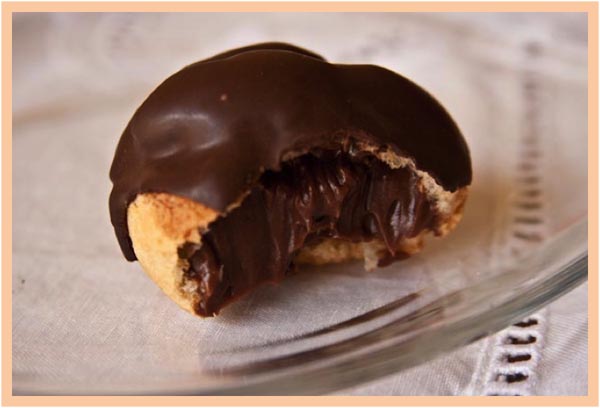 Bigne (cream puff) with chocolate cream The little pastries are less than a quarter the size of a Starbucks muffin. Why does a single one, then, fill me up, when a Starbucks muffin leaves me hungry for more?
I think it has something to do with beauty.
Anche l’occhio vuole la sua parte, say Italians, the eye also demands its share. In other words, what we eat doesn’t just have to please the belly; it has to satisfy the eye.
***
Congratulations to Lynn in Florida who has won Palmento: A Sicilian Wine Odyssey in the random drawing. More book giveaways to come, so stay tuned!
Click to comment.
Click to subscribe.
October 23, 2010
Forests of prickly pears glitter with sunset-colored fruit: burning orange and deepest pink. The fall crop is so abundant in Sicily that most of it plops down onto roadways to rot in the sun—roadkill for nectar-seeking wasps and honeybees.
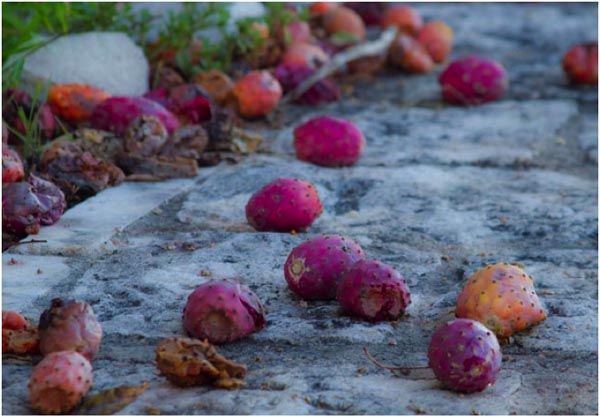
I gave the prickly pear, called fico d’india—literally, fig of India—the cold shoulder for quite a while after my first experience peeling one. Who knew to put on gloves? The invisible barbs lodged deep into my fingertips. I spend hours armed with tweezers squinting on my sunlit balcony, extracting them one by one.
But now I’ve found a happy solution: I drink my prickly pears.
Either in liqueur form …
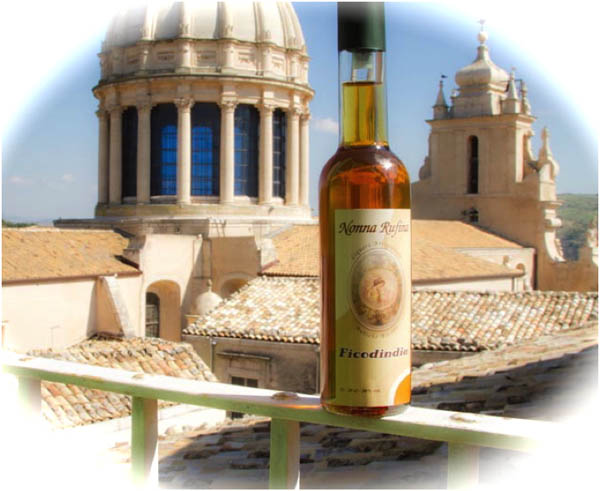
… Or in sweet granita—seeds and all. It tastes like watermelon juice imbued with banana-y blood oranges. Of course I worried that a prickly pear plant would sprout in my stomach after this granita, but so far so good.
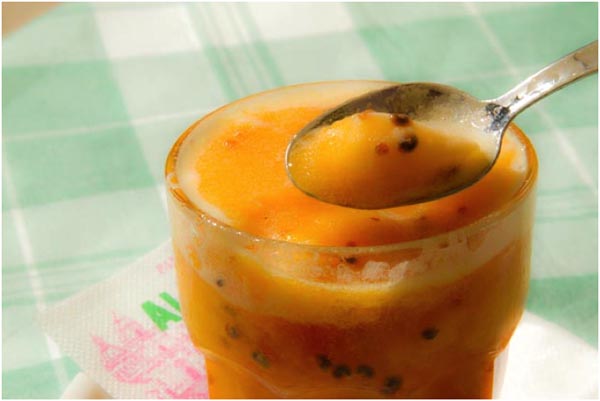
Have you tried the prickly creatures? Discovered a danger-free way to eat them?
***
Click to comment.
Click to subscribe.
September 13, 2010
September mornings are fresh as white sheets snapping on the line. I take long walks up and down stony, ringing steps.
Branches drip with overripe figs. I lean over derelict garden walls and push my arm through tangled vegetation to get at them, then bite into the crunchy redness like you’d suck a juicy orange wedge.

A confession: I didn’t really know a fig from a kumquat until a few years ago (only those gluey Fig Newton atrocities that turned up with some regularity in my school lunchbox). But I love them now. They’re high in fiber and potassium (which will bring your blood pressure down).
Go get figgy, folks! Tis the season. Pair them with a dollop of lush goat cheese and drizzle a blossomy honey on top. Oh, what a nice sticky mess.
***
Here are links to other fresh fig recipes from the New York Times:
Fig tart with caramelized onions
Braised chicken with figs
Grilled figs
What’s your favorite way to eat figs?
Click to comment.
Click to subscribe.
September 3, 2010
Yes, Sicily has changed me. I hang out my wash, speak in pantomime, keep odd Sicilian hours, wear D&G spectacles, tolerate absurdity. And knock back raw milk.
Not quite straight from a cow, but almost. You situate your empty bottle just so under a teat-nozzle, deposit your cash (80 cents a liter), squeeze START, and out spurts a stream of pearly-whiteness. And this cow doesn’t kick!
 "Just-milked (appena munto) Ragusan milk" I glug the fat sweet stuff right from the bottle; it’s half gone by the time I get home.
Could this be dangerous? Am I really “playing Russian roulette with my health” as John Sheehan, director of dairy-food safety at the FDA claims? Was there a good reason for Pasteur’s discovery?
When I Googled “raw milk” a thousand things came up. I was surprised to find that only 6 US states allow it, that there’s a raging debate in the US, and a raw-milk campaign. “Why is it that in America it’s easier to buy drugs, guns, and political favors than it is to buy a gallon of raw milk?” asks one site.
“Americans are afraid of their own shadows,” someone in Italy said to me recently. Is he right?
***

Click to comment.
Click to subscribe.
August 30, 2010
I have met the enemy, and he is the cannolo. Not just any old cannolo, but the heart-stopping, moan-inducing ones at Trattoria Al Molo in Donnalucata, on the southern shores of Sicily. I’d like to die eating one of their cannoli. Does this make sense?
What words can describe it? When you sink your teeth through the crispy-light crust, an orange-flower-infused ricotta comes bursting forth, perfuming your entire mouth. Your eyelids grow heavy and you sway like the sea. Even days later, I’m crazy mad with the memory.
This cannolo is slim and delicate, unlike the pipe-bomb cannoli you find in Brooklyn, or Palermo. And by the way, do you know how the cannolo got its name? The dough used to be molded around canna, cane (reeds) such as these.
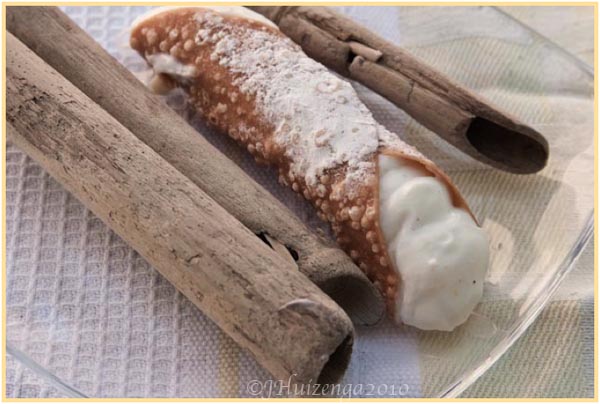
Sicilian cannoli once protected against evil spirits and symbolized fertility. Now they have their own Facebook page. Hal Licino claims that Sicily’s best cannoli are found on the western end of the island, calling EuroBar in tiny Dattilo near Trapani the “Ultimate Altar of Cannolidom.” Hal, have you never been to Donnalucata?
***
PS At Al Molo (an unchic place, 0932-937710) sample the razza alla stemperata (sweet and sour stingray). You know what to order for dessert.
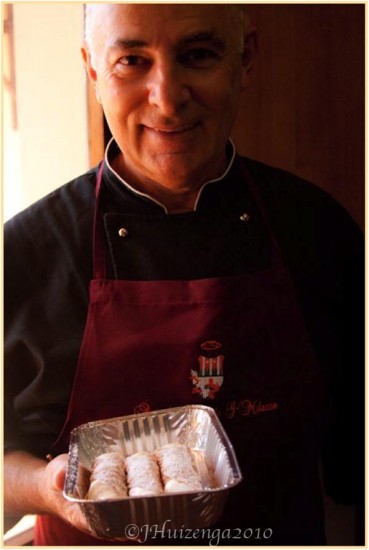 Chef at Al Molo Click to comment.
Click to subscribe.
|
Subscribe to Baroque Sicily
Copyright reserved -
All photos and text on BaroqueSicily are Copyright of Jann Huizenga ©2009-2015, unless otherwise noted. Material may not be copied or re-published without written permission. All rights reserved.
|













